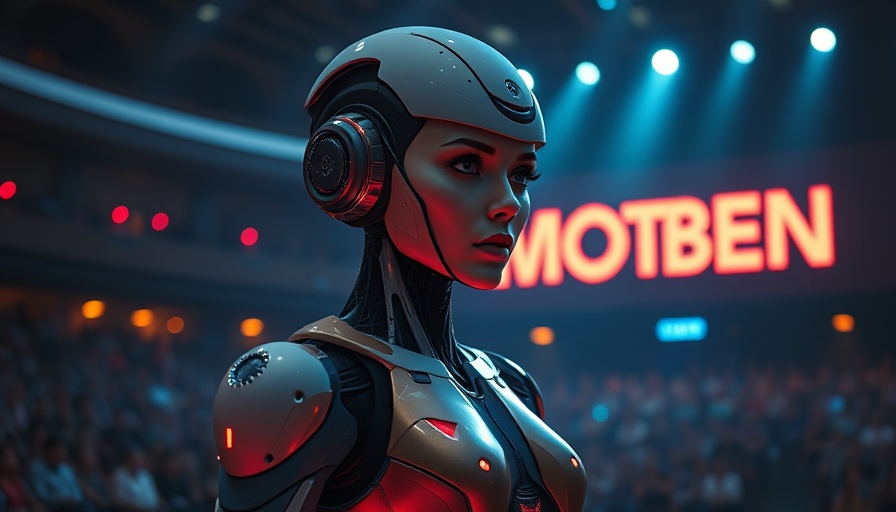
The Rise of AI Development with Code Mender
In the rapidly evolving landscape of artificial intelligence, Google's introduction of Code Mender represents a significant milestone. This groundbreaking tool utilizes sophisticated algorithms to automatically identify and rectify security vulnerabilities in expansive open-source projects, reinforcing the integrity of digital codebases currently housing millions of lines of code.
In 'Google Just Dropped AI That Fixes The Internet', the discussion dives into the transformative capabilities of AI in software development, highlighting key insights that sparked deeper analysis on our end.
Understanding Code Mender: The Security Guardian
Unveiled by Google DeepMind, Code Mender is branded as an AI code developer exclusively designed for open-source security. In a marvel of modern technology, this remarkable system has already been credited with upstreaming a substantial 72 verified security fixes within just six months. By employing advanced techniques such as static and dynamic analysis, alongside fuzzing and differential testing, it achieves an in-depth comprehension of complex code structures, allowing it to not only identify the root causes of vulnerabilities but also to generate and validate effective patches.
The Impact on Open-Source Projects
Open-source projects are crucial to software development; however, they often suffer from vulnerabilities due to constant updates and extensive code contributions. Code Mender's proactive approach to security signifies a transformative shift. By evaluating and rewriting code to adopt safer data structures and integrating tighter compiler-level safeguards like fbound safety annotations, Code Mender doesn't merely react to security flaws—it preemptively mitigates them, greatly enhancing the overall security posture of the software ecosystem.
Case Studies: Success Stories with Code Mender
Code Mender’s prowess is highlighted through its handling of specific vulnerabilities. A significant instance involved rectifying a heap buffer overflow linked to XML parsing—a complex issue often overlooked by even seasoned developers. The AI’s ability to trace the root cause back to nuanced memory handling problems showcases a hallmark capability: the combination of deep contextual understanding with precision in its fixes.
Additionally, in addressing vulnerabilities in the lib webp image compression library—previously exploited in a high-profile zeroday attack against Apple’s iOS—Code Mender effectively incorporated necessary compiler annotations, demonstrating its potential to prevent future attacks should these enhancements be implemented proactively.
Neo: Revolutionizing Machine Learning Workflows
As the AI landscape continues to evolve, Neo emerges as another autonomous player, streamlining machine learning projects to unprecedented levels. Unlike traditional models that require extensive manual intervention and corrections, Neo autonomously handles the full machine learning lifecycle. By condensing what typically takes weeks into mere hours, it drastically reduces workload while increasing efficiency and accuracy.
Gemini 2.5: A New Frontier in AI Utility
In parallel, Google’s Gemini 2.5 has been tailored to execute computer tasks in a manner akin to human operation. It encapsulates the advanced capabilities of Code Mender and extends into broader applications by managing digital tasks autonomously, from website interactions to data entry. This dual capability opens new doors for both developers and businesses alike.
Safety Considerations: Ensuring Responsible AI Development
While the evolution of AI promises remarkable benefits, it also begs the question of safety. DeepMind’s integration of robust safety mechanisms into Gemini 2.5—such as per-step safety checks—underscores an important commitment to responsible AI usage. Developers are equipped with customizable safety frameworks, ensuring user confirmation is required for critical actions, thereby safeguarding system integrity against potential misuse.
Conclusion: Embracing the Future of AI Development
The introduction of Code Mender, alongside innovations like Neo and Gemini 2.5, signifies a profound evolution in the role of AI in software development. As these technologies proliferate, they not only enhance security and efficiency but also set the stage for future AI applications across various industries. Those keen on staying at the forefront of technological advancements would do well to explore these innovations. With all signs pointing towards an increasingly automated future, now is the time to harness the potential of AI to transform workflows and safeguard coding projects like never before.
 Add Row
Add Row  Add
Add 




Write A Comment